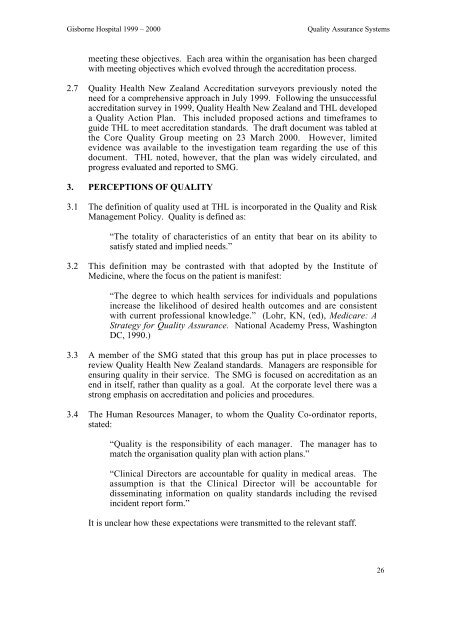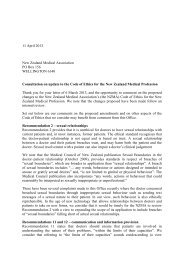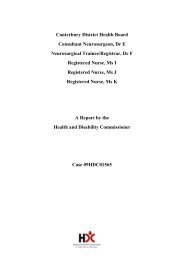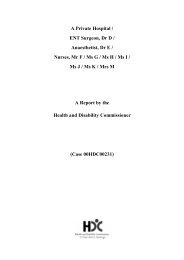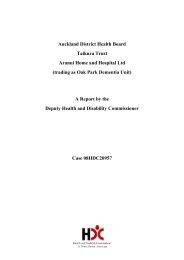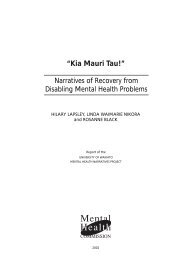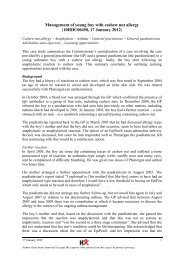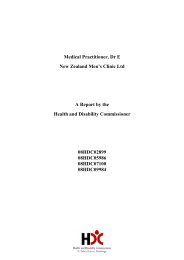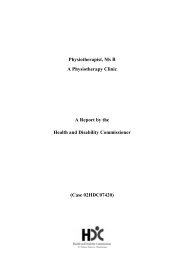Gisborne Hospital Report - Health and Disability Commissioner
Gisborne Hospital Report - Health and Disability Commissioner
Gisborne Hospital Report - Health and Disability Commissioner
You also want an ePaper? Increase the reach of your titles
YUMPU automatically turns print PDFs into web optimized ePapers that Google loves.
<strong>Gisborne</strong> <strong>Hospital</strong> 1999 – 2000<br />
Quality Assurance Systems<br />
meeting these objectives. Each area within the organisation has been charged<br />
with meeting objectives which evolved through the accreditation process.<br />
2.7 Quality <strong>Health</strong> New Zeal<strong>and</strong> Accreditation surveyors previously noted the<br />
need for a comprehensive approach in July 1999. Following the unsuccessful<br />
accreditation survey in 1999, Quality <strong>Health</strong> New Zeal<strong>and</strong> <strong>and</strong> THL developed<br />
a Quality Action Plan. This included proposed actions <strong>and</strong> timeframes to<br />
guide THL to meet accreditation st<strong>and</strong>ards. The draft document was tabled at<br />
the Core Quality Group meeting on 23 March 2000. However, limited<br />
evidence was available to the investigation team regarding the use of this<br />
document. THL noted, however, that the plan was widely circulated, <strong>and</strong><br />
progress evaluated <strong>and</strong> reported to SMG.<br />
3. PERCEPTIONS OF QUALITY<br />
3.1 The definition of quality used at THL is incorporated in the Quality <strong>and</strong> Risk<br />
Management Policy. Quality is defined as:<br />
“The totality of characteristics of an entity that bear on its ability to<br />
satisfy stated <strong>and</strong> implied needs.”<br />
3.2 This definition may be contrasted with that adopted by the Institute of<br />
Medicine, where the focus on the patient is manifest:<br />
“The degree to which health services for individuals <strong>and</strong> populations<br />
increase the likelihood of desired health outcomes <strong>and</strong> are consistent<br />
with current professional knowledge.” (Lohr, KN, (ed), Medicare: A<br />
Strategy for Quality Assurance. National Academy Press, Washington<br />
DC, 1990.)<br />
3.3 A member of the SMG stated that this group has put in place processes to<br />
review Quality <strong>Health</strong> New Zeal<strong>and</strong> st<strong>and</strong>ards. Managers are responsible for<br />
ensuring quality in their service. The SMG is focused on accreditation as an<br />
end in itself, rather than quality as a goal. At the corporate level there was a<br />
strong emphasis on accreditation <strong>and</strong> policies <strong>and</strong> procedures.<br />
3.4 The Human Resources Manager, to whom the Quality Co-ordinator reports,<br />
stated:<br />
“Quality is the responsibility of each manager. The manager has to<br />
match the organisation quality plan with action plans.”<br />
“Clinical Directors are accountable for quality in medical areas. The<br />
assumption is that the Clinical Director will be accountable for<br />
disseminating information on quality st<strong>and</strong>ards including the revised<br />
incident report form.”<br />
It is unclear how these expectations were transmitted to the relevant staff.<br />
26


